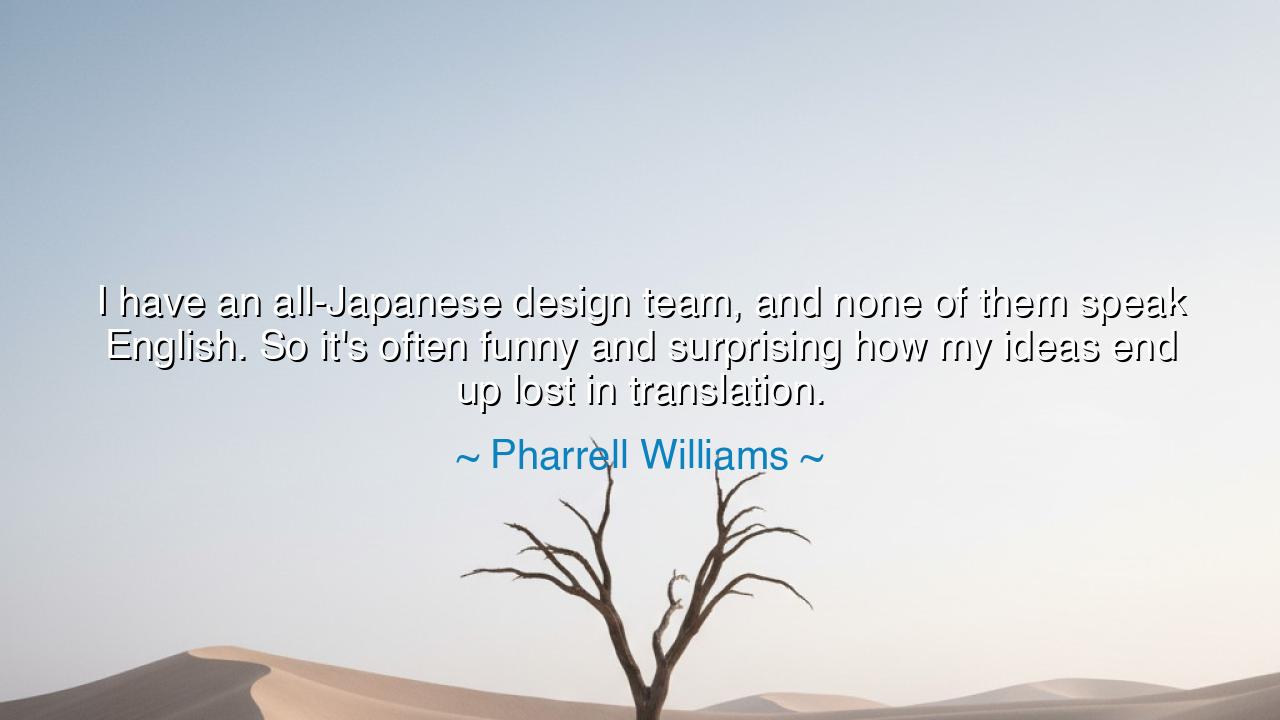
I have an all-Japanese design team, and none of them speak
I have an all-Japanese design team, and none of them speak English. So it's often funny and surprising how my ideas end up lost in translation.






The artist and visionary Pharrell Williams, whose work bridges the worlds of sound, fashion, and imagination, once said: “I have an all-Japanese design team, and none of them speak English. So it’s often funny and surprising how my ideas end up lost in translation.” Though he speaks with humor, his words conceal a deeper wisdom — a meditation on communication, creation, and the mysterious ways that art transcends language. In this reflection, Pharrell touches a truth known to the ancients: that understanding is not only built from words, but also from spirit — and that sometimes, what is lost in translation can lead us closer to beauty than what is perfectly understood.
When Pharrell says his ideas are “lost in translation,” he does not lament, but marvels. For in that loss, something is found — something unexpected, unplanned, and alive. The ancient philosophers often spoke of creation as a collaboration between order and chaos, intention and accident. In this way, Pharrell’s design process — where his thoughts cross borders of language and culture — becomes a living metaphor for how the world itself creates: through misinterpretation, adaptation, and rebirth. The “funny and surprising” outcomes he describes are not failures of communication, but the flowering of diversity. For when ideas are carried across different minds and tongues, they do not merely survive — they transform.
Consider, in this light, the ancient story of the Tower of Babel. Humanity once spoke one language, and in its arrogance sought to build a tower to reach the heavens. But the divine scattered their tongues, so that they could no longer understand one another. Many have read this as a punishment — yet there is another meaning: that in difference, humanity found its true creativity. From many tongues arose many cultures, many forms of beauty, many ways to express the same truth. So too, Pharrell’s team, though separated by words, shares a single vision — and in the fragments of misunderstanding, they build something no single language could have conceived alone.
There is also a gentleness in Pharrell’s observation — a recognition of the humility required to collaborate beyond the self. He does not demand control over every detail, but welcomes surprise. The ego seeks perfection; the artist seeks discovery. In his laughter, we hear the wisdom of one who understands that true creation is a dialogue, not a monologue. His Japanese designers may not hear his words, but they hear his intent — his rhythm, his energy, his essence. And sometimes, what they produce out of that energy reveals more about his own vision than he could have said himself. It is the paradox of art: that what we lose in precision, we gain in soul.
This truth echoes in the story of the sculptor Michelangelo, who once said he did not carve statues, but “freed them from the marble.” His chisel struck stone without fully knowing what lay within. The process was not pure translation of an idea, but a conversation between the artist and the material. Similarly, Pharrell’s words — carried across languages, through sketches, gestures, and emotions — take new form in the hands of his collaborators. What emerges may not be what he imagined, but often, it is what he needed. Thus, the “lost” in translation becomes found in creation — a dance between intention and accident, guided by mutual respect.
Pharrell’s quote also holds a deeper reflection on cultural exchange — how beauty is born when worlds meet. His partnership with Japanese designers is not simply professional; it is a merging of philosophies. The Japanese aesthetic of wabi-sabi, which finds perfection in imperfection and meaning in the incomplete, mirrors his own belief in the playful and unexpected. Their collaboration is a modern form of what the ancients called sympatheia — a harmony between different spirits that reveals the unity beneath diversity. What is “lost in translation” is not lost at all; it is transformed into something universal.
The lesson, then, is clear: do not fear misunderstanding, for it is the soil in which innovation grows. In art, in conversation, and in life, we are all translators — of emotion, experience, and vision. Words may fail, but intent never does. To create, to connect, to truly collaborate, one must embrace the mystery of being misunderstood, and trust that something truer than language will emerge. As Pharrell teaches, laughter and openness can turn confusion into communion.
So, my child, when you find your words lost or your meaning twisted, do not despair. Instead, look for what beauty might be born from the misunderstanding. Speak from the heart, not merely from the tongue. Let your ideas travel, even if they change along the way — for in their journey, they will become greater than you imagined. Remember this ancient truth hidden in Pharrell’s modern wisdom: that creation does not die in translation — it evolves. And through that evolution, we learn that what unites us is not language, but the shared desire to make something beautiful together.






AAdministratorAdministrator
Welcome, honored guests. Please leave a comment, we will respond soon